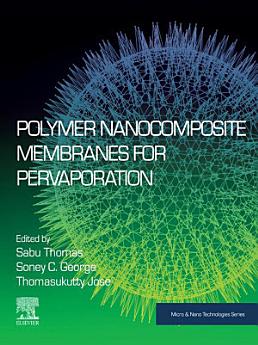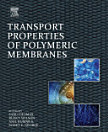Polymer Nanocomposite Membranes for Pervaporation
About this ebook
About the author
Sabu Thomas is the chairman at the Trivandrum Engineering Science and Technology Research Park (TrEST Research Park) and the former vice chancellor at the Mahatma Gandhi University, Kottayam, Kerala, India. He is also the director at the School of Energy Materials, the School of Nanoscience and Nanotechnology, and the International and Inter University Centre for Nanoscience and Nanotechnology. Prof. Thomas is also the former director at the School of Chemical Sciences and the founder of the School of Polymer Science and Technology, Mahatma Gandhi University, Kottayam, Kerala, India. He received his Ph. D. in 1987 in Polymer Engineering from the Indian Institute of Technology (IIT), Kharagpur, India. He has been ranked no.1 in India about the number of publications (most productive scientists). Prof. Thomas’s research group specialized areas of polymers which includes Polymer blends, Fiber filled polymer composites, Particulate-filled polymer composites and their morphological characterization, Ageing and degradation, Pervaporation phenomena, sorption and diffusion, Interpenetrating polymer systems, Recyclability and reuse of waste plastics and rubbers, Elastomer cross-linking, Dual porous nanocomposite scaffolds for tissue engineering, etc. Prof. Thomas’s research group has extensive exchange programs with different industries, research, and academic institutions all over the world and is performing world-class collaborative research in various fields. Professors Centre is equipped with various sophisticated instruments and has established state-of-the-art experimental facilities which cater to the needs of researchers within the country and abroad. His H Index- 133, Google Citations- 86424, Number of Publications- 1300, and Books-160.
Dr. Soney C. George is Dean of Research and Director of the Center for Nanoscience and Technology at Amal Jyothi College of Engineering, Kottayam, India. He has published 240 papers in peer-reviewed journals and conferences. He has also edited and contributed to several books. His research focuses on polymer nanocomposites, tribology of nanocomposites, membranes, and pervaporation.
Dr. Thomasukutty Jose received his master degree in Chemistry from St. Dominic’s College, Kanjirappally, Kerala, India and Ph.D in Polymer chemistry from Bharathiar University, Coimbatore, India. He has 20 publications in peer reviewed journals and conferences. He received best paper presentation awards in various national and international conferences. Currently, he is working as Assistant Professor of Chemistry at Amal Jyothi College of Engineering, Kanjirappally, India.






